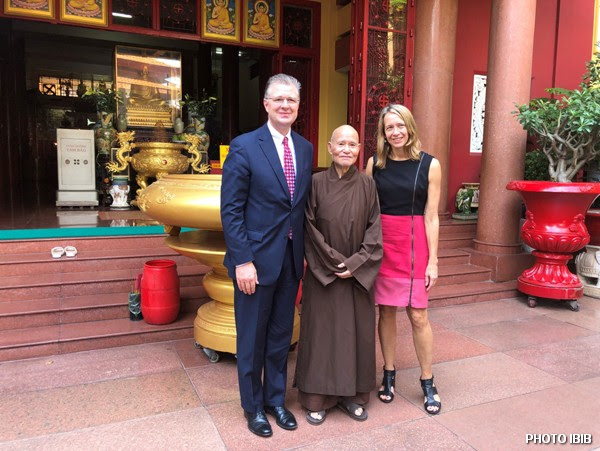PARIS, 15th June 2018 (IBIB) – The U.S. Ambassador to Vietnam Daniel J. Kritenbrink visited Buddhist dissident Thích Quảng Độ, Patriarch of the Unified Buddhist Church of Vietnam (UBCV) at the Thanh Minh Zen Monastery in Ho Chi Minh City (Saigon) where the UBCV Patriarch is under house arrest. The Ambassador was accompanied by US Consul General Ms. Mary Tarnowka,Justin Brown, Political Officer at the US Consulate in Ho Chi Minh City and two members of staff. This is the first visit by the US Ambassador, who took up his post in Hanoi in November 2017.
The meeting took place on Thursday 14th June at 10:00am and lasted for over an hour. Thích Quảng Độ told IBIB Director Võ Văn Ái that the meeting was very friendly and cordial. He handed the delegation a 12-page Memorandum detailing the government’s systematic repression of the UBCV over the past 43 years, and an overview of his main concerns, including religious freedom, Vietnam-China relations, the recent Cybersecurity Law, human rights and democratization in Vietnam.

In his written remarks to the US Ambassador, Patriarch Thích Quảng Độ, 90, described his own detention under house arrest since 2003: “As you see, my living quarters are small. They have been my whole universe for the past 15 years. The government has never formally charged me with any crime – they even say I am free. But my freedom stops at these four walls. I am forbidden to travel, my communications are monitored, and police keep watch on me day and night.”
His detention under house arrest, he wrote, was part of an overall policy to stifle all criticism and dissent: “The government’s aim in detaining me here is to silence my voice. Just as the Police have used violence and brute force over the past few days to silence the voices of citizens demonstrating all over the country to protest the adoption of new laws that would sell out our national interests and curb our rights to free expression”.
He observed that the recent widespread protests in Vietnam reflected deep popular discontent about the draft law debated in the National Assembly on special economic zones (SEZs) that would allow land to be leased to foreign investors for a 99-year periods. “We Vietnamese know the ambitions of our northern neighbour, for Vietnam was China’s vassal for 1,000 years. The demonstrations that broke out this week-end were a spontaneous reaction to the Communist Party’s concession of our resources and lands”.
“Although I am confined in my Monastery”, he wrote, “I feel very close to the people who have taken to the streets and risked their liberty to defend their ideals. Their protests are a warning call to our government – a call to defend our sovereignty and protect our homeland, but also a call for pluralism, democracy and human rights”. Thích Quảng Độ denounced the Cybersecurity Law adopted by the National Assembly this week that “seriously violates freedom of expression online”and “gives Hanoi new tools to censor the Internet, imprison critics and stifle dissent”.

He informed the US Ambassador that since 1975, when the Communist Party took power in Vietnam, the UBCV had consistently maintained that there could be no development or progress in Vietnam without democracy and human rights. “In my numerous appeals to the Vietnamese government and the Communist Party, I have always insisted that we cannot defend our country if we are denied the right to participate equally in our nation’s affairs”.
“Even religious freedom cannot exist without democracy and human rights. Under the government’s new Law on Belief and Religion, we have a minimal freedom of worship, but true freedom of religion or belief remains taboo”.
Thích Quảng Độ urged the US Ambassador to ensure that religious freedom and human rights remained a high priority in the United States’ relationship with Vietnam, and called upon him to seek every opportunity, both in public and private, “to press Vietnam to cease repression against the UBCV and all other non-recognized religious communities; to re-establish the legitimate status of the UBCV and allow us full freedom to exercise our religious activities in peace”.
In his “Memorandum” on violations of religious freedom against the UBCV, Thích Quảng Độ made the following recommendations to the government of Vietnam:
- Vietnam should recognize the legitimate status of the UBCV and all other “non-recognized” religious communities and allow them full freedom of religious activity:
- release all UBCV clergy and followers detained under house arrest or in prison on account of the nonviolent exercise or expression of their religious beliefs ;
- cease harassment and intimidation of UBCV followers, including members of the Buddhist Youth Movement, and allow them freedom of activity to engage in educational, spiritual, humanitarian and social activities for the development of the people;
- restore all UBCV property confiscated after 1945 in Northern Vietnam and after 1975 in the South ;
- repeal or revise all religious legislation which restricts the activities of religious organizations or submits them to Communist Party control; amend the new Law on Belief and Religion to bring it into line with Article 18 of the ICCPR;
- remove all vaguely-worded provisions in the Criminal Code that criminalize the exercise of freedom of religion or belief;
- revise the Cyber security Law and other laws on regarding freedom of expression on-line or off-line to conform with the rights enshrined in Article 19 of the ICCPR;
- guarantee the fundamental rights to freedom of conscience, expression, assembly and association as guaranteed in the United Nations’ International Covenant on Civil and Political Rights, to which Vietnam is a State Party.


No comments:
Post a Comment